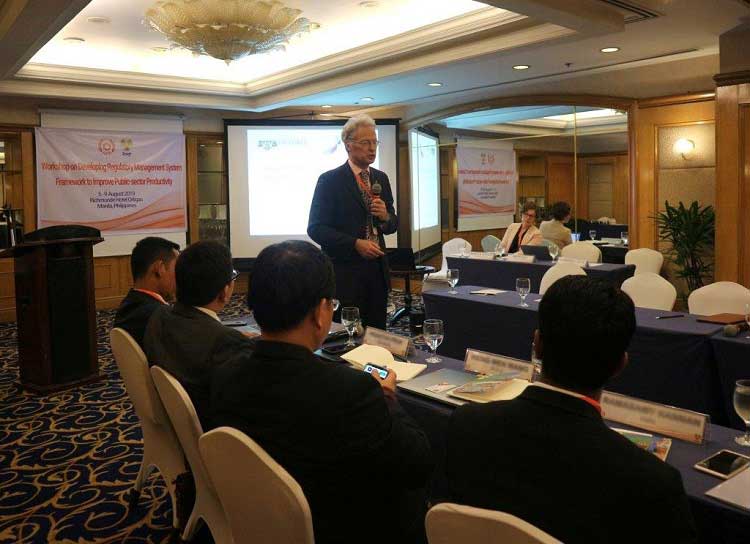
Select Page
 The Asian Productivity Organization (APO) organized a workshop on Developing a Regulatory Management System Framework to Improve Public-sector Productivity, 5–9 August, in Manila, hosted by the Development Academy of the Philippines (DAP). Three resource persons from France, Malaysia, and New Zealand as well as two local speakers made presentations on current RMS topics. The workshop was attended by 17 individuals from 10 member countries.
The Asian Productivity Organization (APO) organized a workshop on Developing a Regulatory Management System Framework to Improve Public-sector Productivity, 5–9 August, in Manila, hosted by the Development Academy of the Philippines (DAP). Three resource persons from France, Malaysia, and New Zealand as well as two local speakers made presentations on current RMS topics. The workshop was attended by 17 individuals from 10 member countries.
OECD guidelines on regulatory management systems (RMS) categorize regulatory functions into the four core components of policies, tools, institutions, and procedures. All must be harmonized for institutionalization of good regulatory governance under which policies result in improved economic performance in the long run. While overregulation may stifle business productivity and innovation, underregulation may allow the production of substandard products and services. Both results are magnified by the rapid pace of technological change, making the appropriate regulatory balance increasingly difficult to achieve.
Because regulations are essential for governments to promote well-being and economic growth, they must be continually reviewed and improved for smooth functioning of RMS. The APO Smart Public-sector Program calls for developing good RMS frameworks in terms of institutions, tools, and policies to both benefit citizens and enhance the long-term competitiveness and productivity of member countries. Specific objectives of the workshop were therefore to: review regulatory management approaches and practices of governments; determine any gaps in regulatory administration and enforcement; develop RMS frameworks for participants’ institutional settings; and formulate common goals to improve the delivery of regulatory services for increased public-sector productivity in member countries.
DAP CEO and Head Atty. Engelbert Caronan opened the workshop by expressing support for the APO’s Smart Public-sector Program and giving an overview of related initiatives in the host country. He singled out the Modernizing Government Regulations Program under the Philippine Development Plan 2017–2022, to which the DAP was an ongoing contributor. Numerous Philippine government units, including those operated by the Anti-Red Tape Authority, were cooperating to reduce unnecessary regulatory burdens on businesses, he noted. “We should aim to have an RMS that enables governments to fulfill their mandates and be flexible enough to continue to do so in a changing environment,” concluded Atty. Caronan.
The participants visited the City Government of Paranaque and the Central Bank of the Philippines, both public-sector organizations, to learn about their RMS applications. They also drafted action plans for adopting RMS fundamentals in their countries to create multiplier effects.
Philippine participant Maria V.F. Magsino felt that the workshop was “very useful,” since: “A lot of public regulations being implemented by different agencies result in a lack of coherence, silos in delivery, lack of coordination, etc.” She acknowledged that the workshop had given her guidance on making public regulations more impactful by clarifying the elements of a good RMS. Several attending the workshop suggested that the contents could be offered in the form of national follow-up projects, with RMS knowledge and applications contextualized to local conditions.